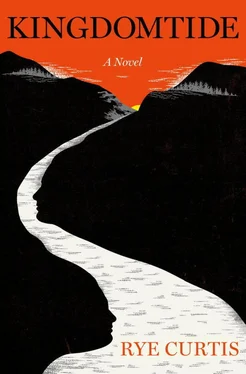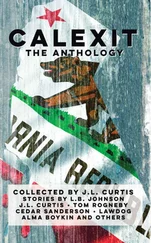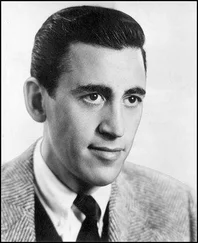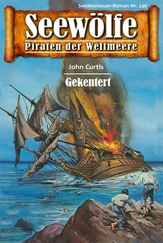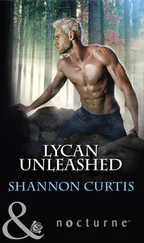The next morning he was up dousing the fire I had kept going for more than a week. If you’re really coming, he said, come on.
I followed him with my walking stick into the woods. We walked for a day and come dark made camp in a dry sandy draw beneath a spruce chewed up with terrible little red snickering beetles. For supper we boiled up some more hardtack and furry jerky and slivers of a slow gray squirrel that he had stamped to death on the way. We slept. We set out again in the morning, exchanging not word one.
We pulled on that way over the course of the day and then we reached a shallow gulch upon nightfall. A skinny cold creek ran through it, silver under the moon. White pine grew bare and twisted here and there but most common was mountain grass and flows of scree.
The masked man was stopped before the gulch. He indicated a place with his glove. A particularly large and devilish pine had grown into five bone-white digits like an enormous skeletal hand. A lean-to hut as long as a school bus, partly hidden from view, was nestled against the palm of it. The hut was made up of branches held together by yellow rope and strips of many-colored fabrics and it looked sturdy enough. For a door cover it had what I took for a child’s bed linen, being that it was printed with the repeat likenesses of a muscled character I had seen before on cereal boxes in the grocery store.
The masked man led me down a little path to the hut. He pulled back the sheet. Inside it was as dark as the inside of a cow and he set about lighting a fire in a little stove that had once been a bulk can of pitted olives. He also lit a kind of lantern he had made with a pine knot set in the broken skull of some toothy critter. Then I could see the place. At one end was a pallet of twigs and cloth where I assumed he had been sleeping. All kinds of clothes were piled in a corner near the pallet and a funny Swedish kind of hat hung from a sprig off the pine. Letters which spelled out the word Russia were carved into one of the load-bearing rafters. The hut looked like it had been lived in for a spell.
He moved the clothes to the opposite corner of the hut and in the space left he rolled out a blanket printed with illustrations of a maniacal dolphin. You can take my bed for tonight, he said. I’ll make you one tomorrow.
I told him I was perfectly comfortable on the ground, which was not just me being polite. By that time I was mighty used to it. Still he insisted. I thanked him.
We ate more jerky he produced from a folded sweater. He was always a dear to remember that I did not have all my teeth, and he generally boiled everything until it was soft. It was very delicious. After all, I had been eating bat for weeks. He also cooked up wild tubers and berries for better nutrition. I was very tired and I fell asleep as soon as I had eaten. I do not even recall shutting my eyes.
He was gone when I woke in the morning, but a fire was burning in the stove and a pot of meat was simmering for breakfast. I B BAK was spelled out on the ground in small rocks. I spent the day patrolling the creek with my walking stick and peering into the shallows for a slow fish I could thump. Fish were easy for me to eat, but I never did catch one.
That evening I was relieving myself against a rock face some good ways down the creek when the man showed up around the bend with his tackle box and fishing rod and a line of three trout. He was not wearing his mask. My goodness, we startled each other! He dropped the trout in the dirt and hid his face before I could clearly see it. I endeavored to cover myself up without making a mess.
I’m sorry, he said, his back to me, tying the shirt around his head.
I put my clothing, such as it was, back together and stood up. You cannot come and go as you please like that, I snapped. I never know where you are!
He apologized again.
I accepted his apology and told him that I was sorry I had snapped at him.
I cooked the trout on the stove with some wild onions he had found growing in the woods above the gulch. At the time it was the best thing I had ever smelled. The man sat in the corner of the hut and watched me from behind his mask. I was wrapped in a blanket he had given me. The weather had turned cold once the sun had gone and outside the wind sang unknowable songs in that big old strange-fingered pine.
We ate our supper in silence. The inside of the hut was poorly lit, but the stove and the pine-knot lantern put out enough light to feed our shadows. Once we had finished and I had set aside the piece of shale I had been using for a plate the man looked at me again. His lively green eyes were balanced in the holes of his mask and his mouth twitched under it. He got up and went to the far corner of the hut and retrieved a big green glass bottle from behind the stack of firewood there. He held it up and gently shook it at me.
What is it? I asked.
Dutch courage, he said. I went back for it at the shelter. Not many pleasures out here. The ones we have start to get pretty valuable.
I told him that I seldom imbibed. Clarendon is in a dry county and Mr. Waldrip had been a teetotaler. As I recall I had only ever had a real drink of alcohol on Christmas Eve in 1969. Mr. Waldrip and I had driven out to spend Christmas with my niece, Mary, and her husband, Jacob, in Albuquerque, New Mexico, and I drank a glass of champagne, said something inappropriate about their cat, and went to bed.
The man unscrewed the cap and folded up the bottom of his mask just under his nose, to where the short bushy beard on his chin showed, and he took a swallow from the bottle. I could not tell you if he liked it or not, but he took a measured rest like a man playing a trumpet in a concert band and had another gulp.
I had the notion that I might as well drink, considering my situation. I put my hand out for the bottle. He got up and brought it to me. I took it and drank. The alcohol burned my throat and I coughed. Drinking gin out of the bottle is a thing I imagine you must practice a good deal before there is any grace to be found in it.
He brought me some water in the goat horn. I drank it and then I swallowed from the bottle again and coughed again. It was not long before I was good and well in my cups. I dabbed my face with Erasmus’s fur. The man sat crosslegged by me near the stove and we shared the bottle between us and listened to the wind like a regular couple of cowpokes on the drive.
Struggling to keep the giddiness from my voice, I told him that I did not know how to thank him for everything he had done for me.
That’s all right, he said, and he swallowed some more.
I took the bottle back from him and had another gulp and coughed and my ears got hot. Then I asked him why he lived out there in that desperate way.
Long story, he said.
I have the time, said I.
He said nothing to that.
What about your parents? I asked.
What about them?
Do you visit them?
No.
They must miss you.
They don’t.
Sure, they must.
You don’t know what you’re talking about.
I do. You are a big-hearted angel. I surely would have been long gone had you not been kind enough to look after me.
He got the bottle back from me and drank. He looked at the fire in the stove and breathed through his nose, drinking all the while. He yanked the bottle off his lips with a great smack. I watched your plane go down, he said. I was setting traps in the valley and I saw it come over the mountain. Saw it hit before I heard it. Didn’t think anybody could’ve survived. I stayed out there for two nights to see if a rescue effort would come. When nobody did I thought I’d get up there fast and salvage some supplies from the wreck before anybody’d show up. Thought maybe I could get a radio. I kept my distance and watched the mountain with my binoculars. I hiked up in the morning a few days after it crashed and I nearly made it there before nightfall but I saw your fire on the way. Then that storm came and I saw you.
Читать дальше
Конец ознакомительного отрывка
Купить книгу
